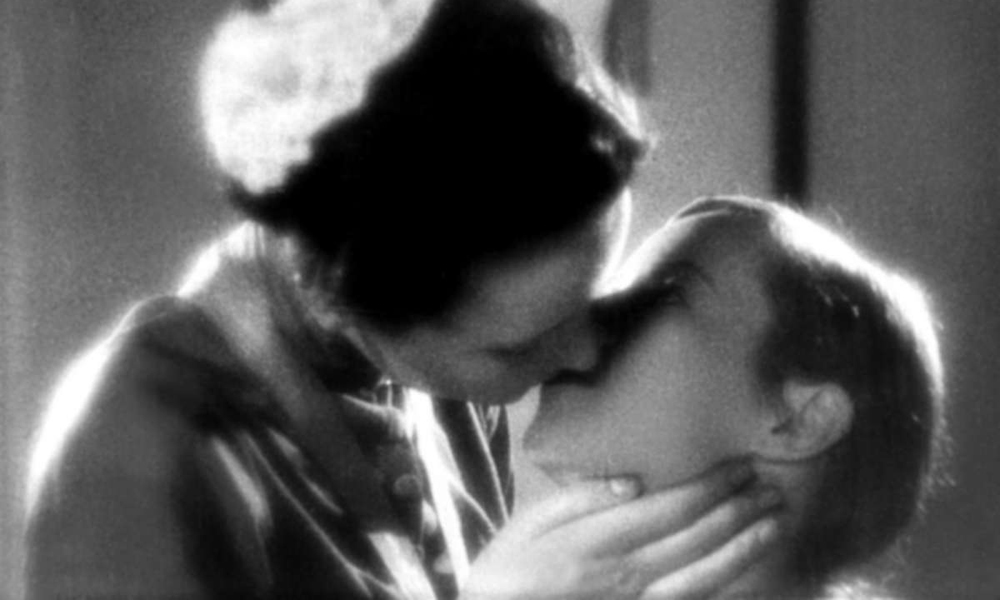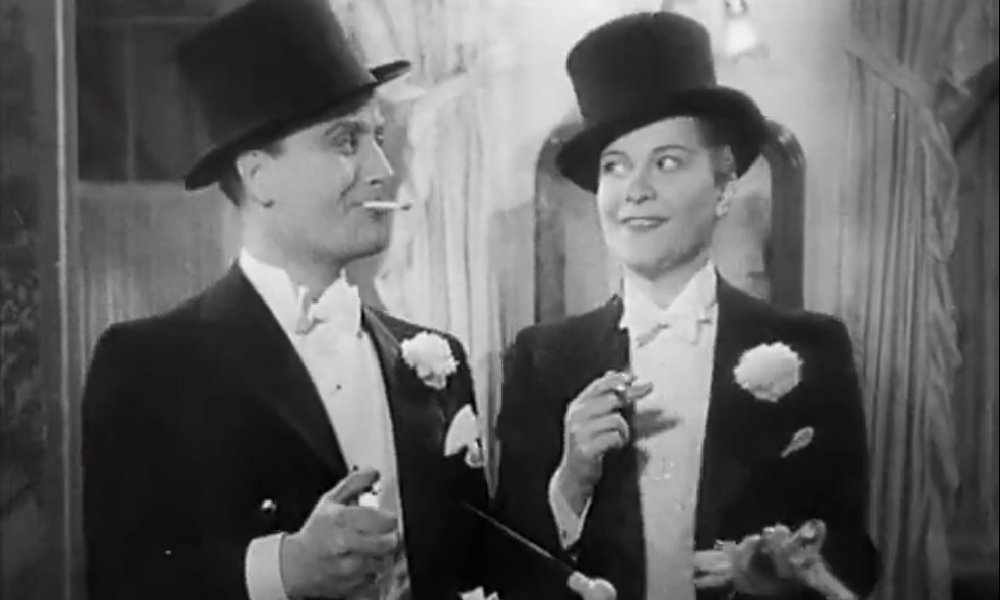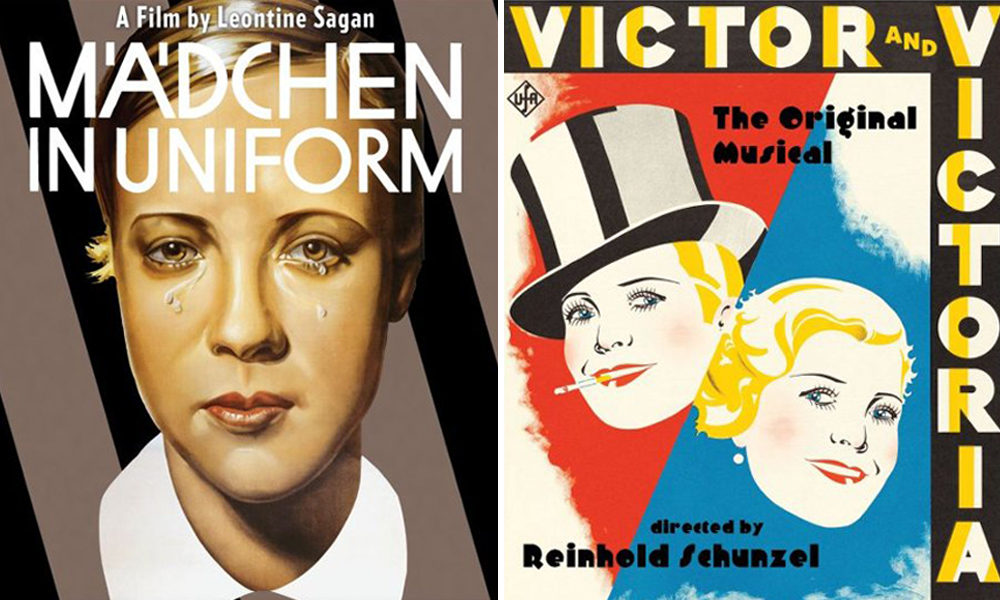Towards the end of the Weimar Era two films were produced which are now considered early classics of Queer cinema…
In between the two world wars Germany saw an incredible renaissance in art, literature, theater, cinema and music. From 1918 until 1933, the year Hitler came to power, the German people enjoyed a freedom they had never experienced before. There was even an LGBT community during those years, though once Hitler and the Nazis took over it all came crashing to a horrible end. The years before Hitler are now known as the Weimar Era.
Towards the end of this period, two films were produced which are now considered early classics of Queer cinema. Both went unseen for many years but were rediscovered some years ago. Now Kino Lorber, purveyors of classic cinema, have released both films on Blu Ray under their Kino Classics label. Both films are also streaming at Kino Now, Kino’s in house streaming service.

Madchen in Uniform (1931), an intense drama, did well upon its initial German release. It was eventually banned by the Nazis and wasn’t shown in its native land until the 1970s. It was almost banned in the US, but Eleanor Roosevelt, who had just become First Lady, championed the film and it did receive a limited release stateside. Madchen in Uniform is one of the first, if not the first, films to depict lesbian love on the screen.
Hertha Thiele stars as Manuela, a lonely young girl who’s left at a rigid boarding school by an uncaring aunt. Though she is accepted by the other students, Manuela still feels very out of place. She begins to feel better after she meets Fraulein von Bernburg, a friendly and compassionate teacher who’s a far cry from the stern, unfeeling headmistress of the school and the other equally strict teachers. It is von Bernburg’s custom to kiss the girls goodnight at bedtime, which she usually does on the forehead. In a scene which no doubt shocked 1930s audiences, Manuela, and only Manuela, is kissed on the lips.
Manuela develops a crush on her teacher, and it appears that von Bernburg might be returning her affections. On a fateful day Manuela gets drunk and blurts out her feelings to the entire school, after which a horrified headmistress isolates Manuela from the other girls. Manuela is crushed and attempts suicide by nearly jumping from a fourth floor railing, but she’s rescued by the other girls. The headmistress is left to ponder the averted tragedy that she almost caused.
Decades ahead of its time, Madchen in Uniform stands as a powerful plea for tolerance and has a strong anti-fascist message, a message that no doubt resonated at a time when the Nazis were first coming into prominence. Thiele is superb in a role which required her to convey a wide range of emotions. She’s particularly powerful in the scene where she’s kissed by von Bernburg, a scene in which she displays the tenderness of a young girl’s first love and an aching desperation. Dorothea Wieck is equally good as von Bernburg, a kind hearted woman who may or may not be returning Manuela’s affections, but who nonetheless feels sympathy for her young charge. Emilia Unda is disturbing as the headmistress, a misguided woman who can’t see the humanity in her students and who’s forgotten how to relate to other people. Though small in stature, the headmistress is an overpowering authority figure who makes for a terrifying visage.
The film features an all female cast and was directed by Leontine Sagan at a time when women were rarely given a chance to direct films. The stark black and white cinematography and the lack of a music score creates a haunting mood which underscores the depth of Manuela’s emotions.
Now ninety years old, Madchen in Uniform still packs a powerful punch and is a must see film for anyone interested in the history of Queer cinema.

Released just as Hitler came to power, Victor and Victoria (1933) be the last film of the Weimer era. A musical comedy about a woman who achieves fame by pretending to be a female impersonator, it’s amusing and entertaining enough. But it’s not a gay film. When it was remade as Victor/Victoria in 1982, the lead character was a woman masquerading as a gay man who works as a female impersonator. That film had several gay characters and, through humor, raised many questions about masculinity and gender.
Homosexuality is completely absent from Victor and Victoria. When a male admirer becomes interested in the Victor/Victoria character, he knows perfectly well that the object of his affections is in fact a biological woman.
Still, the film is well made and features some amusing laughs. Much of the dialogue is sung in verse, which gives the film a delightfully lighthearted feel. Renate Muller, then a big name in German cinema, gives a good performance as the gender bending lead character. Hermann Thimig is a little over the top as the real Victor, a failed actor and not very good female impersonator who convinces a failed actress that they can make their fortune if she assumes his onstage persona of Victor and Victoria while he manages her.
Though Victor/Victoria is a wittier and more thought provoking film, Victor and Victoria remains an engaging work and a fun film to watch.
Both films are in German and are presented with optional English subtitles. Both are available on Blu Ray, and can be streamed in the LGBT section of the Kino Now website.






POST A COMMENT